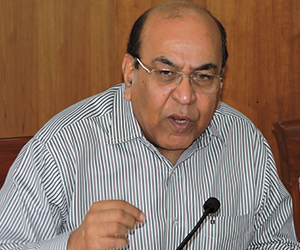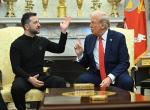For a change it’s good that there isn’t too much euphoria over the announcement of the Comprehensive Bilateral Dialogue between India and Pakistan during the recent visit of Mrs Sushma Swaraj, India’s External Affairs Minister, to Islamabad.
I continue to hold the brief that Pakistan came into the talks on the basis of the altered international security environment after the Paris attacks. Pakistan can sense its own isolation in a world which is now obsessively against terror and those who perpetrate it. It is not Daesh alone or the Al Qaida which is perceived as a vector of terror, Pakistan and its security establishment is very much within the focus of this perception. Being an active member of the Islamic world, having a strong strategic relationship with China or being geo-strategically significant to the US is no longer a guarantee against future isolation that may be imposed on Pakistan; hence it is playing on being perceived as more reasonable and more mature in handling its security issues. That brought it squarely into the peace process though not without US nudging.
There are many impediments to the normalization of relations even after the recent positives but chief among them are the LoC in J&K and terror related issues elsewhere in India. Peace and quiet in J&K doesn’t work in favor of Pakistan because the ‘pot has to be kept simmering’. Low grade activity in the hinterland doesn’t attract international attention, trans LoC firing with 81 mm mortars does. That is where the LoC comes in, as an instrument of diplomacy, which Pakistan chooses to play every few months. If dovetailed with an odd trans IB foray by a suicide jihadi squad the message gets pinned even deeper. Who initiates these events at the LoC? I asked some Pakistani delegates on the sidelines of a Track 2 event and proceeded to give them the logic of why India would never initiate exchanges across the LoC and why Pakistan would. It is simple; India’s strategy on J&K is all about bilateralism and no interference from the international community; it wishes no attention towards J&K by other nations; hence quiet on the LoC favors it. However, Pakistan’s entire strategy, despite being a signatory to the Shimla agreement, is based upon internationalization and putting pressure on India. It spares no opportunity to do so and finds the LoC one of the best instruments to draw international concern. If Pakistan thinks that this policy can play itself out positively during the course of a comprehensive dialogue of the type envisaged and that it can calibrate this to its requirement it has to rethink. Public opinion in India is not easy to handle for any government, especially on issues concerning Pakistan. Besides this, any terror related incidents in the vicinity of the LoC, such as the recent ones at Tangdhar, which are well within control of the Pakistan Army, will draw tremendous negativism and will not allow any dialogue to run its course. Can the Pakistan Army and the ISI rein in the temptation; a forced retribution by the Indian Army in a trans LoC mode will once again set back the process by a couple of years. Let Pakistan’s security establishment, commonly referred as the Deep State, be wary of this.
The second serious impediment in the peace process is going to be the Pakistan propaganda about the Indian hand in Pakistan’s internal security issues, which essentially means support to the TTP and to Baluch separatists. This is a good diplomatic ploy employed by Pakistan without much weight. It tries to balance out India’s 25 year old and well substantiated allegations of Pakistan’s proxy war in J&K and rest of India. India has convinced the world about its own noninvolvement but there is nothing wrong in giving ourselves this capability and there is no need to decry it. That India’s reach is limited and its intent only benign must however continue to be our projection leaving this in the shade of grey. Pakistan fears Mr Ajit Doval’s capability and there is no reason for us play down these fears.
Some may but I do not term Siachen and Sir Creek, low hanging fruit. Taking Siachen as an example; firstly, it is linked to J&K as an issue so why delink it when the trust deficit is nowhere near dilution. Secondly, the strategic environment has changed drastically with the signing of the CEPC agreement which allows access to the Chinese through the disputed territory of Gilgit-Baltistan (GB). Siachen holds a strategic advantage for us being on a flank of GB and our north most deployment.
Lastly, and this is something on which I will write more comprehensively in due course; the India Pakistan dialogue is between mismatched systems which may find it extremely difficult to come to terms. Pakistan is a nation where religion forms an essential part of its nationalism. It is driven by an Army that refuses to go back to the barracks and its entire ethos is offensive. The use of faith as a weapon has been played out by it through most of the period of its existence, at least since its decimation in 1971. It’s handling of the post-Soviet withdrawal period and the sponsorship of the Taliban, the setting up of the Haqqani network and the nurturing of faith based organizations believing in violence, such as Hafez Sayeed’s Lashkar e Toiba (LeT), all prove its perception that power flows from potential of violence which can multiply in capacity through the passion of religion. In today’s world what is the real worth of Hafez Sayeed to the Pakistan Army and how will this act as an impediment in a serious peace process with India is something that the Pakistan Army has probably never contemplated. It must give consideration to all the negatives of the situation in Afghanistan where its proxies, the Haqqanis, Taliban etc will lead the nation to greater chaos. Afghanistan needs money to survive and the world is extremely wary about pitching in for a bottomless pit where Pakistan is only promoting more violence. A better strategy would be to work with India at stabilization of Afghanistan and offset the possibility of another civil war which will only end up with more refugees inside Pakistan. Will that realization ever come?
Negotiating will never be easy with a nation which loves to crow about its status of being a smaller state than India and hence threatens use of nuclear weapons from time to time. Similarly, a nation which prefers to commit economic hara-kiri by refusing trade with a richer neighbor and denies the latter access to other states, is obviously obsessively incapable of rising to see the interests of its own people. While Pakistan has a democracy and a strong media the looming presence of the Deep State denies it the benefit of both. It has to deal with a nation such as India where economics is the key word, the army is apolitical and religion is an issue only for the fringe. It is a nation where electoral politics forms a major part of the discourse and the media has a space where it acts as virtual conscience keeper.
The mismatch in the functional realities of the two nations does not allow for easy negotiations on contentious issues. This by itself is the biggest impediment to a smooth peace process. Negativism has never been my forte and therefore while speaking of impediments it is important to mention that rapprochement is something which is not impossible. It is the environment which needs to be improved and this won’t happen from cricket but from firm moves on the political front. Yet, the key to it all lies in the court of the Pakistan Army and its attitude towards where it wishes to take Pakistan. Perhaps Pakistan’s civil society needs to introspect on this too for I find many good young people who probably would appreciate just what I have written here.
Published in IBN LIVE on 14th December 2015
(Disclaimer: The views and opinions expressed in this article are those of the author and do not necessarily reflect the official policy or position of the Vivekananda International Foundation)










Post new comment